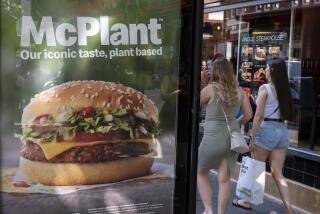Editorial: The beef industry is freaking out over plant-based meat? Too bad
- Share via
The Impossible Burger, which first appeared in grocery stores in September, is made entirely of plant-based ingredients. But it looks, smells, feels and — most mportantly — tastes so much like real hamburger beef that it’s hard to tell the difference between, say, the Impossible Whopper now available at Burger King and the original charred flesh version that the fast food chain has been selling for decades.
In fact, plant-based burger alternatives from companies such as Impossible Foods and Beyond Meat, both based in California, have evolved so far from the cardboard-tasting alternatives of yore that they have triggered a backlash from the beef industry. The Center for Consumer Freedom, a nonprofit that advocates on behalf of the fast food and meat industries, among others, has launched an “informational” campaign targeting plant-based meats. The campaign has included TV and online ads, as well as print ads in newspapers, including this one. The ads seem to imply that not only is a faux burger an “ultra-processed” patty, but that it might be junk food that is even junkier than the average beef burger.
While it’s true that a plant-based meat alternative is processed — meaning altered in the preparation process, like just about everything else at the grocery store — and it’s true that eating one is not as healthy as say, a pile of raw vegetables, it’s best to take the ads with a generous pinch of salt. (Or sodium, which the ads correctly note is higher in precooked plant patties than in the beef kind.)
For instance, the additives and preservatives in plant-based meat highlighted in one ad sure sound scary. Who wants something called titanium dioxide in their meal? But the truth is that additives such as those listed in the ads are regularly used in all sorts of packaged foods.
And if methylcellulose, a food thickener, sounds unappetizing, it’s reallly nothing compared with the E. coli or salmonella poisoning you can get from regular meat. The truth is that beef and other industrial meats are often packaged with things a lot more dangerous to human health than food additives. You want to talk about a public health threat? The widespread prophylactic use of human grade antibiotics in cows and other livestock has contributed greatly to the rise of lethal antibiotic-resistant organisms.
Besides, the ad campaign misses the bigger point. Choosing an Impossible or Beyond burger at one of the growing number of fast food and sit-down restaurants that offer them isn’t just about eating healthy (though they typically have less fat and cholesterol than beef hamburgers). Burgers, be they made from processed pea protein or processed slaughtered mammal, will never be as healthy as organic raw vegetables.
What’s appealing is the prospect of enjoying a juicy burger without the bitter aftertaste of guilt.
Because, let’s face it, there are tremendous environmental costs to eating cows. Cattle ranching is contributing to climate change, and not just because methane from cows and livestock is responsible for about 14.5% of greenhouse gas emissions. More broadly, our global food production system emits more than a third of the world’s greenhouse gases. Yet we can’t seem to curb our meat appetite even knowing that huge swaths of the Amazon forest have been razed, and continue to be cut down to make room for more cattle to feed the growing demand for beef. Humans also know full well that many animals live short, brutal lives in appalling conditions for the sole purpose of becoming bacon, chicken thighs, pork loin, veal cutlets, filet mignon and other foods for humans to enjoy at dinner.
So why do we still do it? Because meat tastes soooooo good and it is such an efficient source of protein. Plus, did we mention it’s so tasty? A plant-based meat that satisfies meat cravings and delivers protein but with a smaller climate footprint is a potential environmental game changer and the reason Impossible Foods was one of the recipients of the U.N. Global Climate Action Award in 2019. No wonder the meat industry is on guard.
More to Read
A cure for the common opinion
Get thought-provoking perspectives with our weekly newsletter.
You may occasionally receive promotional content from the Los Angeles Times.










